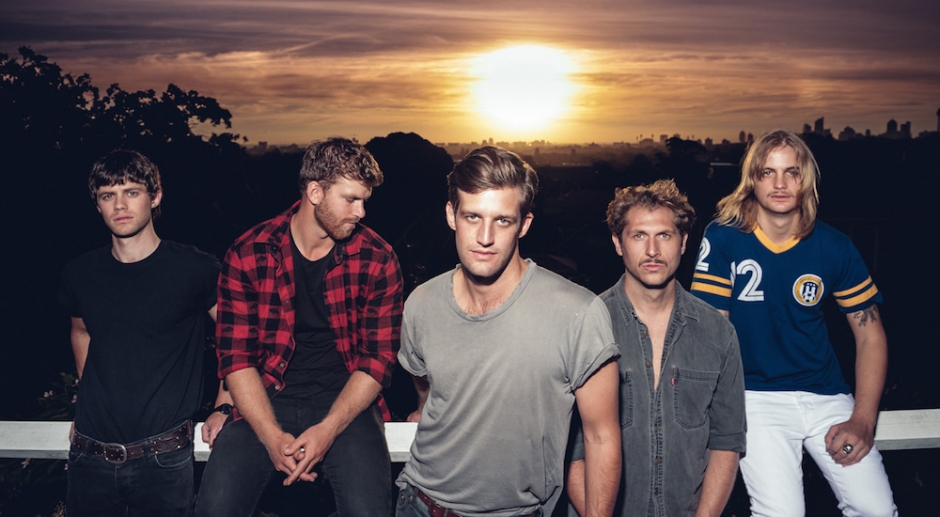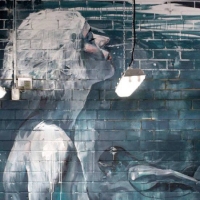 Life, Death, Time For TukaHow the Sydney MC found his songwriting solace away from the Thunder.
Life, Death, Time For TukaHow the Sydney MC found his songwriting solace away from the Thunder.

Jumping Through Hoops With The Rubens
The Rubens on the challenges of working with labels and the manic stages of touring.
Oasis, AC/DC, Kings Of Leon, INXS, Van Halen: all bands made up of family members who have shaped music. And while not all of these bands have descended into feuds, it's not exactly an irregular occurrence. Perhaps the most famous quarrel is the Gallagher brothers of Oasis who seemingly live to spend their days shit-talking each other, despite breaking up in 2009. The Rubens are part of this canon of family bands consisting of three brothers - Sam Margin on guita/lead vocals, Elliott Margin on keys/backing vocals and Zac Margin on lead guitar, plus Scott Baldwin on drums and William Zeglis on bass.
Sitting down with Sam and Elliott to discuss their upcoming album release, I touch on this convoluted history in the hope it doesn't sound like a loaded question. just genuinely curious as to how they separate being a band from a family. “We don’t think about business very much, we think about the whole band and the band success. And that’s as far as we go, we don’t think about separate things.” Sam says brusquely. Immediately setting the tone for the interview; Sam, the eldest brother, is the leader onstage and his younger brother, Elliott, would let Sam take charge in our 20 minute chat.
The interest in music began at home but as Sam says, “We weren’t one of those crazy families that played music all the time.” Their mother is Drama and English teacher who teaches piano at home and their father is a Design & Technology teacher. Music in their household was something gently encouraged. But to go from being encouraged to play an instrument to a professional musician is a big step, no? “Definitely. When I started learning piano out of my own choice…my parents never suggested that I could be huge, it was more just a good hobby and skill to have,” says Elliott. It opened your eyes to what you could do? “…Once it became up to us I guess we might have stopped going to lessons, played at home or picked it up at our own leisure when we were ready. But it was something we could all do…” And the rest - the formation of the band, uploading Lay It Down to Triple J Unearthed, and going to New York to record their debut album with David Khan - is, as they say, history.
“When we were playing tiny shows our dad - he’d be working all day but then he’d come home from work - put us all into the van, drive us into the city so we could play the show. And then wait for us in the van while we played and help us load it afterwards.”
And coming home after releasing their self-titled debut, platinum album in 2012, what changed? “You go home it’s all exactly the same. People treat you like shit and call you dickhead. It’s all normal. They’re like, ‘How was your trip? Good? Cool. Do you want a beer?’ Which is sweet, it’s what you want.” The Rubens formed in Menangle - a far-flung Western suburb of Sydney near Camden. And according to Wikipedia, The Rubens are one of two notable local products - the other being Albert Stephen Stanner, a churchwarden in the 19th-20th century. And with a population of 877 The Rubens became celebrities in town. “They [friends] want to know what you’ve been up to. And you end up talking about yourself a lot, which happened a lot in the first year and then I think everyone got bored of it," Sam laughs, "It’s nice now because it isn’t like that."
And to return a success to their parents was a highlight, as Elliott explains: “When we were playing tiny shows our dad - he’d be working all day but then he’d come home from work - put us all into the van, drive us into the city so we could play the show. And then wait for us in the van while we played and help us load it afterwards.”
And in the space of one album they had played 120 shows across Australia and America. Starting in GoodGod Small Club in Sydney, a venue with a 300-person capacity, they reached the Enmore Theatre in Sydney, capacity 2,500, within a year. But what was it like to finish the tour? “It’s like extended manic depression. You get adrenaline, people are excited you’re there and just the feeling that you’re productive. So coming off the touring of that first album and then straight into writing, it’s a massive switch of lifestyle,” Sam tells.
The switch occurred again in October 2013 after touring in support of Grouplove across the United States. Writing began the same month and after touring for so long the band needed to find excitement elsewhere. “I remember saying that I was excited to write music but then you’re excited to go tour once you finish writing,” Sam recalls. The songwriting finished in April 2014 and the plan was to release their second album in September, two years after they released The Rubens LP. However they didn’t enter the studio till October 2014, Sam sums up why pretty succinctly: "Labels."
“You can’t choose when you’re going to write a great song.”
Delving into the world of labels and their commercial desires can be confronting for bands. “…You have them saying, 'We think there are a few more in you', and you never want to hear that as an artist but I guess they are kind of right as you always do have a few more in you. It’s just working out when to stop,” Sam explains, musing on the process behind their second album. Obviously a bigger and better second album is what most acts would strive for, but the success of that debut is a big mountain to climb. And as Sam admits, the time period the band had set was unrealistic: “You can’t choose when you’re going to write a great song.”
Indeed, the title track of their album Hoops wasn’t written until early 2015, long after the rest of the album had been finished. "Hoops, for us, is describing how we had to jump through all the challenges the label created for us to put out this album."
Hoops is out this Friday 7 August via Mushroom, go HERE to pre-order a copy, and HERE to check a full list of shows for their massive national tour with Saskwatch and Winterbourne.
 Life, Death, Time For TukaHow the Sydney MC found his songwriting solace away from the Thunder.
Life, Death, Time For TukaHow the Sydney MC found his songwriting solace away from the Thunder.
 Culture & The Creative Process With Kim Kim KimCatching up with the Perth-based artist ahead of her first solo exhibition.
Culture & The Creative Process With Kim Kim KimCatching up with the Perth-based artist ahead of her first solo exhibition.